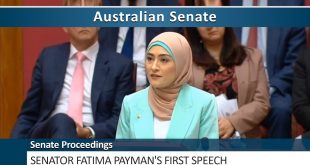Rawalpindi, Pakistan – Prior to the advent of Islam, women were widely regarded as non-entities in many societies around the world. Indeed, it has taken centuries for women to gain rights equal to those of men, at least in theory, if not in practice. But the struggle for complete gender equality has not ended.
Within this struggle, many fingers point to Islam as one of the biggest hurdles to women’s rights. But, when we consult the Qur’an, this does not appear to be the case. Traditionally conservative customs embedded in society do not live up to the Qur’an’s vision of dignity for women.
The Qur’an says: “O mankind! Be careful of your duty to your Lord Who created you from a single soul and from it created its mate and from them twain hath spread abroad a multitude of men and women. Be careful of your duty toward God in Whom ye claim (your rights) of one another, and toward the wombs (that bear you)” (Qur’an 4:1).
This verse clearly demonstrates that men and women in Islam are equal to each other both intrinsically – within the very act of creation – and extrinsically, with respect to both their relationship with one another and their duties before God. In fact, the singling out of women at the end of this verse for special reverence as de facto mothers is the only indication of relative inequality, albeit in favour of women.
In pre-Islamic Arabia, parents would often commit female infanticide because they considered the birth of a daughter an inauspicious omen for the family. The Qur’an condemned feelings of shame at the birth of a girl, and said of those who commit such acts: “He hideth himself from the folk because of the evil of that whereof he hath had tidings, (asking himself): Shall he keep it in contempt, or bury it beneath the dust. Verily evil is their judgment” (Qur’an 16:58-59).
Fourteen centuries after Islam’s beginnings and the progress, development, education and enlightenment that followed, we still observe the stigma attached to having a daughter in certain parts of the world, like in much of South Asia, for example. In a society where men often support the entire family, the birth of a son is seen as greater cause for celebration.
Though the empowerment of women, resulting from better education and employment, is changing societal structures, we must do more to honour the gender equality expounded by the Qur’an. Forced marriages, “honour” killings, and women’s confinement to the home by culture, tradition and societal norms have no endorsement from Islam.
Political and religious leaders in some of the more traditionally conservative Muslim societies, such as the tribal areas in Pakistan, should respect the Qur’anic view of women’s status and rights and work to build on that dictum.
Islam granted rights of inheritance to women 12 centuries before they were granted to European women: “Unto the men (of a family) belongeth a share of that which parents and nearer kindred leave, and unto the women a share of that which parents and near kindred leave, whether it be little or much – a legal share” (Qur’an 4:7).
Islam was revealed at a time and in a society in which women themselves had been inherited as property; it was nothing short of revolutionary for them to have their own inheritance rights recognised.
In Muslim discourse, the debate over women’s rights, or any rights for that matter, is always understood in the context of rights and responsibilities from an Islamic perspective. To respect these rights and responsibilities and to understand our role in the development of a society, we must educate ourselves. Education and knowledge are mandatory upon men and women in Islam.
After all, it is education that serves as a catalyst for change. “Say (unto them, O Muhammad): Are those who know equal with those who know not? But only men of understanding will pay heed” (Qur’an 39:9).
The teachings of Islam must take precedence over the cultures and customs with embedded bias against women’s constructive role in many Muslim societies, ironically in the name of the very religion that has granted women far greater rights than these social structures are willing to accept. Any empowerment efforts in accordance with the Qur’an’s vision, which upholds women’s status before the law, must be fully supported. To those who would deny women such rights, we ask, “Will they not then ponder on the Qur’an?” (4:82).
* Dr. Aftab Ahmad Khan, (makhan103@yahoo.com) is a retired professor and author of many books including Sex and Sexuality in Islam (2006). This article is part of a series on Muslim women and their religious rights written for the Common Ground News Service (CGNews).
 Sri lanka Muslims Web Portal Diversity and Inclusiveness
Sri lanka Muslims Web Portal Diversity and Inclusiveness



